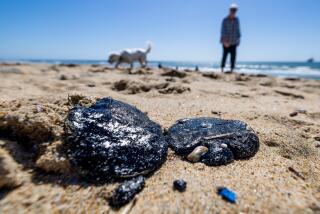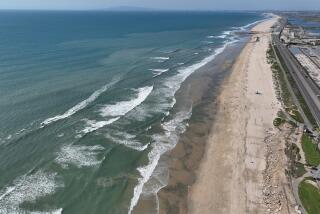In the Sound, Fury Over Spill
- Share via
SEATTLE — Early morning Oct. 14, a vessel spilled up to 1,500 gallons of heavy-grade oil into Puget Sound near Tacoma, fouling more than 20 miles of shoreline. It cost nearly $2 million to clean up.
The spill was not considered major, and the immediate environmental effects were minimal. What has angered and galvanized both activists and officials is that the culprit has not been caught.
The incident is being called a “spill and run” -- a rarity in Puget Sound -- and local officials are pursuing the investigation with the intensity of a homicide case.
“We help murder victims, we look for wanted fugitives. We look at this as a crime,” said Sheriff’s Det. Ed Troyer, coordinator of the Tacoma-Pierce County Crime Stoppers. The law enforcement group is offering a $7,000 reward for information leading to a resolution of the case.
This is the first time the group has become involved in an oil-spill investigation. So far, its bulletins -- on television, radio and the Internet -- have generated more than 30 tips, Troyer said.
Gov. Gary Locke, incensed by the spill and the culprit’s getaway, formed an oil-spill response task force. “There’s no such thing as a small oil spill,” he said at a recent news conference. As the governor worked to fill the task force, investigators from the U.S. Coast Guard and the state Department of Ecology scoured the West Coast for suspect ships.
Investigators have boarded and taken petroleum samples from vessels in Oregon, Alaska and California that are believed to have been in the Puget Sound on the night of the spill. They have narrowed the search to 12 to 20 ships.
Lt. Cmdr. Michael Dreier of the Coast Guard said that the culprit or culprits could face fines of up to three times the amount of the cleanup cost. There also could be some jail time.
“It’s ridiculous that people will do this and think they can get away with it,” Dreier said.
But not all the venom and frustration have been directed toward the unknown perpetrator. Residents and environmental groups have also lashed out at government officials for what they perceive as a lax response to the incident.
According to preliminary reports, a tugboat captain reported the spill in a narrow channel called Dalco Passage about 1:15 a.m. Because of darkness and heavy fog, officials later said, the cleanup and investigation didn’t begin for six to eight hours. By that time, the oil had spread to beaches on Vashon and Maury islands and had reached as far north as Eagle Harbor on Bainbridge Island.
A thick, dark sheen coated the water in those areas, prompting state officials to close the beaches and ban the harvesting of shellfish and other intertidal species. The shellfish closure remains in effect.
“So much time has elapsed since the incident, I wonder if the trail has gone cold,” said Kathy Fletcher, who heads a citizen watchdog group called People for Puget Sound. “It’s inconceivable to me that we have such a pathetic response system that when it’s dark or foggy, we can’t go out there and do something. This is the Northwest. It’s dark and foggy a lot out here.”
Fletcher wondered out loud about what would happen if a spill as big as the 1989 Exxon Valdez incident occurred in the Sound -- and said that she didn’t think the region was prepared for such an incident. “That is our nightmare,” she said.
Although a spill would be unwelcome in any area, Fletcher said, the Puget Sound is particularly vulnerable because of its labyrinthine shape, its bends and curves, channels, harbors, inlets and islands. A single spill can effect numerous beaches on all sides. And because of weather and tides, cleanup is more difficult, Fletcher said.
Ann Stateler, vice president of the local chapter of the American Cetacean Society, said that the long-term damage done by the oil spill -- its effects on salmon and herring spawn, on sea grasses and creatures as large as killer whales, may never be determined.
The cumulative effect of pollution in the Sound, Stateler and Fletcher said, has led to the decline of nearly every animal species that lives there.
Stateler, who lives on Vashon Island, woke up the morning of the spill to find that the slick had washed up on her beach. It was the first time that had ever happened, she said.
“I just felt so helpless and powerless and angry,” she said. “The moral degenerates who did this ... should suffer criminal consequences.”
More to Read
Sign up for Essential California
The most important California stories and recommendations in your inbox every morning.
You may occasionally receive promotional content from the Los Angeles Times.









